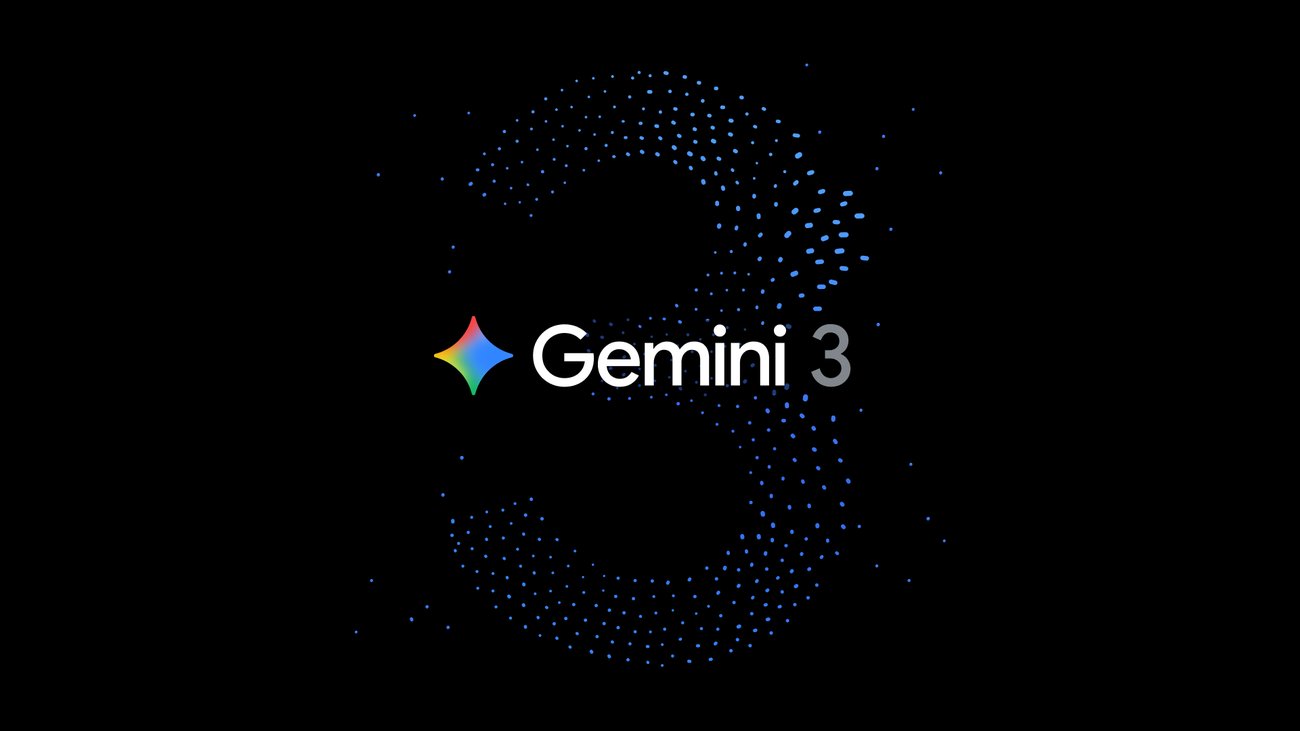Table of Contents
Introduction
Google has officially launched Gemini 3, marking a significant step forward in the pursuit of next-generation artificial general intelligence. Gemini 3 delivers enhanced reasoning, powerful multimodal understanding, advanced agentic capabilities, and extraordinary scalability across Google’s entire ecosystem.
Nearly two years after the Gemini era began, Google has expanded the model’s abilities far beyond basic text or image processing. With Gemini 3, AI doesn’t just interpret information — it understands context, emotion, and complexity on a deeper level.

What is Google Gemini 3?
Google Gemini 3 is the latest and most advanced artificial intelligence model developed by Google DeepMind, representing a major leap in the capabilities of large-scale AI systems.
Unlike its predecessors, Gemini 3 is designed to be natively multimodal, meaning it can seamlessly understand and generate content across various types of data—including text, images, audio, video, and code—within a single task. It builds upon the progress of previous Gemini models by integrating superior reasoning, natural language understanding, and expanded context handling, making it one of the most powerful AI models ever released.
Available in multiple versions—Nano, Pro, and Ultra—Gemini 3 is optimized for everything from mobile devices to enterprise-scale applications. It’s already integrated across Google’s ecosystem, powering tools like Bard, Search, Gmail, and Docs, and it’s also accessible to developers through the Gemini API and Google AI Studio. Whether you’re a business, developer, or everyday user, Gemini 3 sets a new benchmark for AI performance, usability, and scalability.
Leadership Behind Google Gemini 3
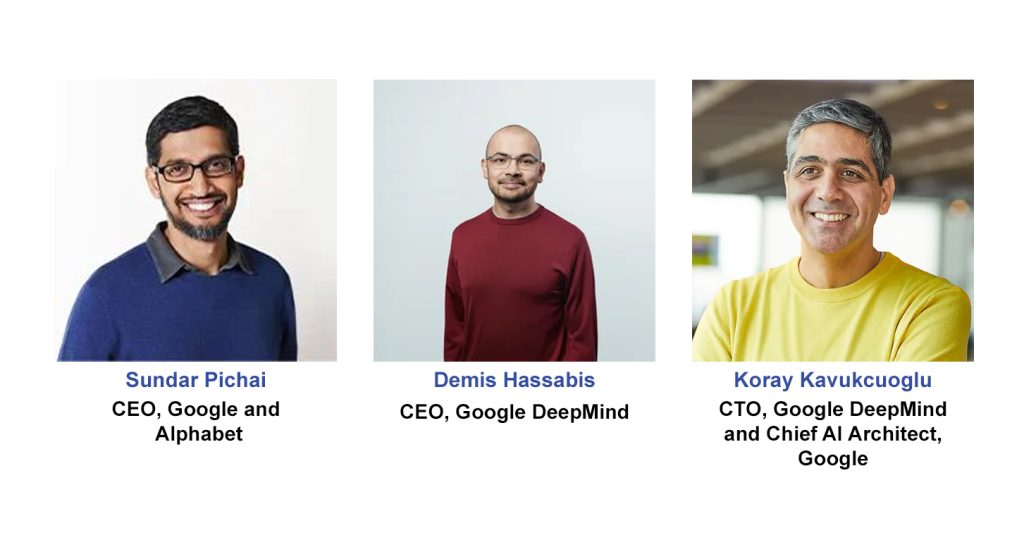
Google Gemini 3 is shaped by the vision of leaders across Google and Google DeepMind, whose combined expertise in AI research, engineering, and responsible innovation drives this next-generation multimodal model.
Sundar Pichai — CEO, Google & Alphabet
- Serves as CEO of both Google and Alphabet, and sits on Alphabet’s Board of Directors.
- Leads Google’s mission to build products and services powered by advanced AI.
- Drives the company’s long-term vision for innovation, scalability, and global impact.
Demis Hassabis — CEO, Google DeepMind
- Leads one of the world’s most influential AI research organizations.
- Oversaw breakthroughs like AlphaGo, the first AI to defeat a world champion in Go.
- Guided the development of AlphaFold, solving a 50-year scientific challenge in protein folding.
- Drives DeepMind’s mission to advance frontier AI research with real-world impact.
Koray Kavukcuoglu — CTO, Google DeepMind & Chief AI Architect, Google
- Recognized globally as a leading expert in artificial intelligence.
- Leads the development of Google DeepMind’s state-of-the-art generative AI models.
- Oversees large-scale integration of these advanced AI systems across Google’s products.
Key Features of Google Gemini 3
- Multimodal AI: Natively processes and understands text, images, video, audio, and code in a single prompt or task.
- Advanced Reasoning Abilities: Outperforms previous models in complex logic, step-by-step reasoning, and problem-solving (beats GPT-4 in benchmarks like MMLU & HumanEval).
- Multiple Model Sizes:
- Gemini Nano – Lightweight, runs on Android devices like Pixel 8/9 (on-device AI).
- Gemini Pro – Mid-range, accessible via Bard and API.
- Gemini Ultra – Most powerful, used in Gemini Advanced for pro users.
- Code Proficiency: Excels at writing, explaining, and debugging code; supports multiple programming languages.
- Global Language Support: Launched with support for 40+ languages, expanding rapidly across 180+ countries.
- Seamless Ecosystem Integration: Powers AI features in Gmail, Google Docs, Bard, Search, Pixel devices, and more.
- Built-in Safety & Ethics: Uses red-teaming, reinforcement learning from human feedback (RLHF), and content filters to ensure responsible use.
- Developer-Friendly:
- Available through Google AI Studio, Gemini API, and Vertex AI.
- Ideal for building apps, chatbots, and business tools.
- Human-like Interaction: Improved perplexity and burstiness make conversations feel more natural and intelligent.
- Massive Context Handling: Retains longer context in conversations and documents, enabling more coherent outputs over extended inputs.
- Task Automation & Agents (Coming Soon): Future versions will include AI agents that can perform multi-step tasks autonomously.
What's New in Google Gemini 3?
In a note from Google CEO Sundar Pichai, the company emphasizes that Gemini 3 brings “a step-change in intelligence and usefulness,” now powering key Google products and developer tools from day one.
Here’s a breakdown of key innovations in Gemini 3, and what they mean for enterprise content, strategy, tech and operations.
State-of-the-art reasoning & benchmarks
Gemini 3 Pro—one of the flagship variants—delivers significantly improved performance across major AI benchmarks:
- It “tops the LMArena Leaderboard with a breakthrough score of 1501 Elo.”
- On “Humanity’s Last Exam”, it reaches 37.5% without tools; on GPQA Diamond: 91.9%.
- On Maths: 23.4% on MathArena Apex.
- Multimodal metrics: 81% on MMMU-Pro, 87.6% on Video-MMMU.
The model isn’t just “bigger” or “faster” — it is more deeply capable of reasoning across modalities (text, image, video, code), understands nuance, and can tackle complex tasks.
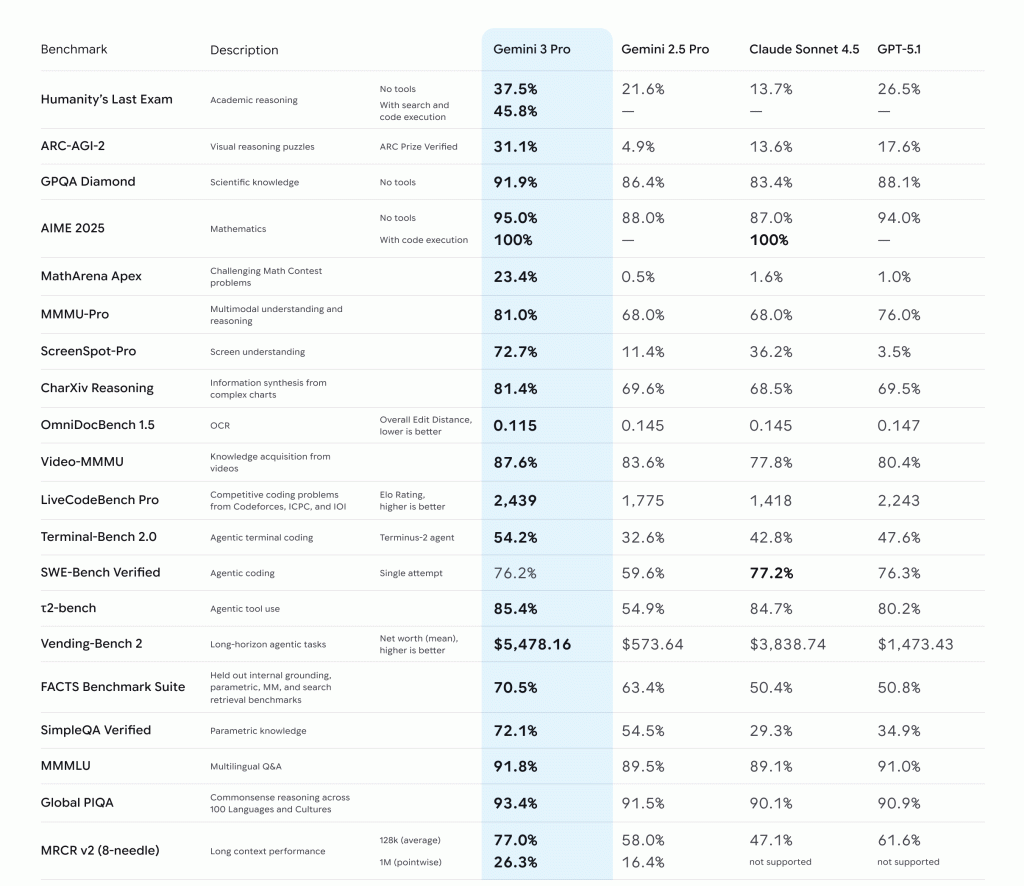
Multimodal, long-context and agentic capabilities
Gemini 3 builds on prior generations (Gemini 1 and 2) by combining:
- Native multimodality (images + text + video + code)
- Long context window (up to 1 million tokens)
- Agentic tools: The ability to act, plan and execute across workflows, not just respond to prompts. For example: booking services, organising inboxes, and long-horizon planning.
Gemini 3 Deep Think
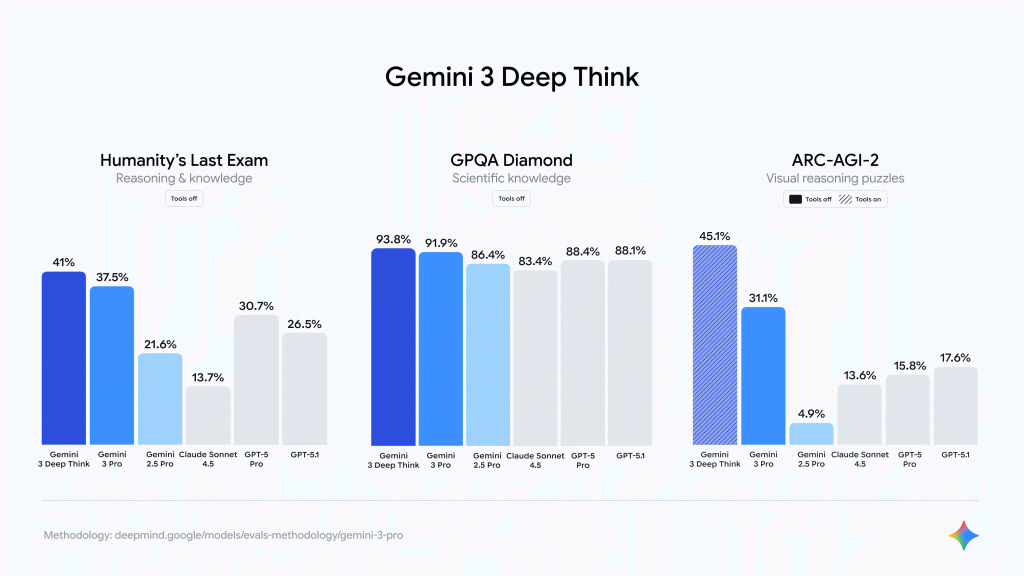
Gemini 3 Deep Think pushes the boundaries of intelligence even further, delivering a significant leap in Gemini 3’s reasoning and multimodal understanding capabilities.
- This enhanced mode enables the model to tackle increasingly complex and sophisticated problems.
- During testing, Gemini 3 Deep Think surpassed the already strong performance of Gemini 3 Pro on key benchmarks such as Humanity’s Last Exam (achieving 41.0% without tool use) and GPQA Diamond (reaching 93.8%)
- AI Mode in Search now uses Gemini 3 to help users better understand information on the web.
- It enables new generative UI experiences — such as immersive visual layouts, interactive tools, and dynamic simulations — all created instantly based on the user’s query.
Developer & enterprise tooling
For developers and enterprises, Gemini 3 unlocks:
- Agent-first development via a new platform, Google Antigravity, where agents can plan, code, and validate autonomously.
- Integration into Google’s stack: Gemini API, AI Studio, and Vertex AI for enterprises.
- Third-party support: code editors, dev IDEs, external platforms.
Responsible development & safety
Google emphasises that Gemini 3 is their “most secure model yet” and has undergone extensive safety testing:
Key Benefits of Google Gemini 3
Learn Anything
- Designed to seamlessly synthesize information across text, images, video, audio, and code.
- Extends multimodal reasoning with advanced vision, spatial understanding, multilingual strength, and a 1M-token context window.
- Accurately interprets and translates handwritten documents—such as family recipes—into fully shareable digital formats.
- Processes complex academic content, transforming research papers, long-form lectures, and tutorials into interactive flashcards, visual summaries, and other learning aids.
- Provides expert-level analysis of sports videos, identifying areas for improvement and generating tailored training plans.
Build Anything
- Demonstrates exceptional zero-shot generation, enabling the creation of richer and more interactive web interfaces from complex prompts.
- Represents the most advanced model for vibe coding and agentic coding, supporting greater autonomy in products and improving developer productivity.
- Leads the WebDev Arena leaderboard with a score of 1487 Elo.
- Shows significant advancements in tool-use and coding benchmarks, including 54.2% on Terminal-Bench 2.0 and 76.2% on SWE-bench Verified.
- Integrated across a broad ecosystem of developer tools and platforms, including Google AI Studio, Vertex AI, Gemini CLI, Google Antigravity, as well as third-party environments such as Cursor, GitHub, JetBrains, Manus, and Replit.
Plan Anything
- Demonstrates major advancements in long-horizon planning compared to earlier versions introduced during the agentic era of Gemini 2.
- Leads the Vending-Bench 2 leaderboard, a benchmark that evaluates long-term strategy by simulating the management of a vending machine business.
- Maintains consistent tool usage and reliable decision-making across a full simulated year of operations.
- Delivers higher returns without deviating from the assigned task, showcasing improved stability and focus.
Companies using Google Gemini 3
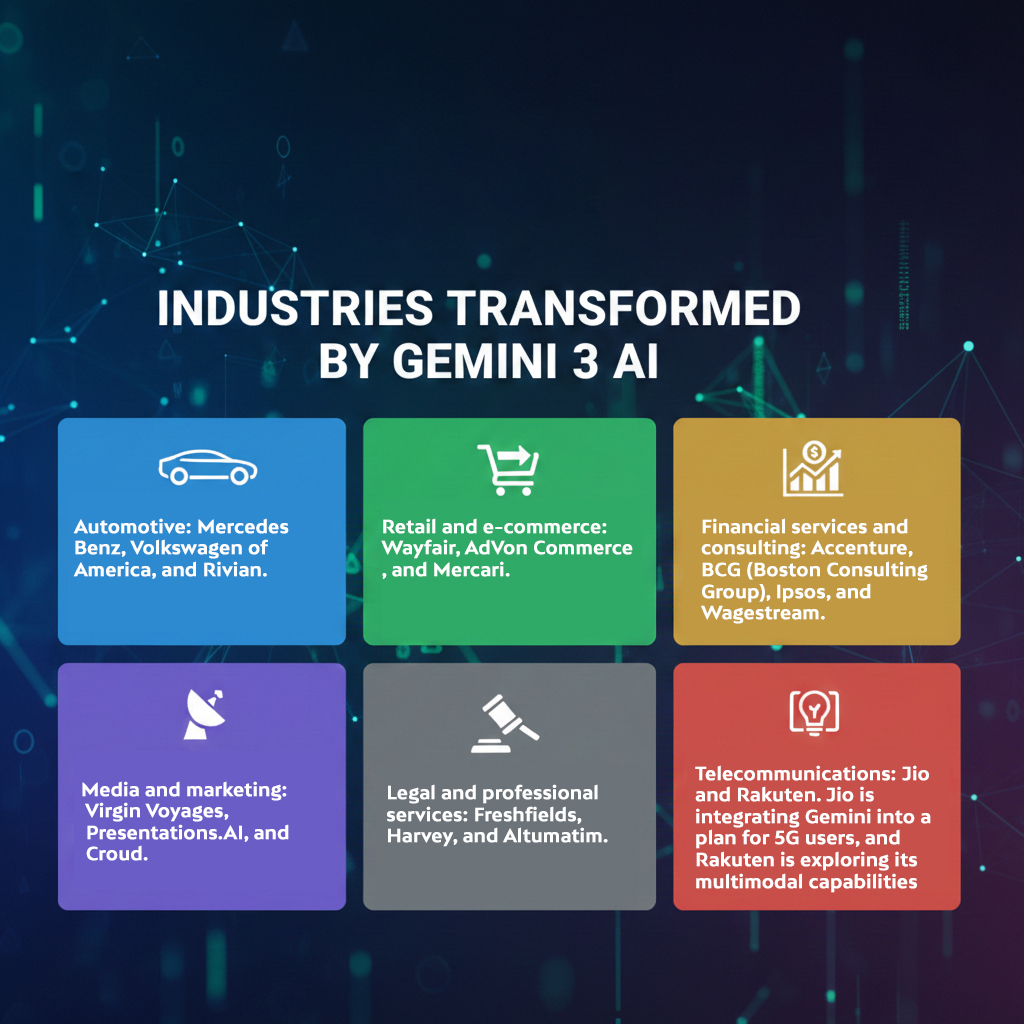
Companies across different sectors are using Google’s Gemini model. These companies primarily use Google Cloud’s Vertex AI platform and integrations within Google Workspace.
Examples of companies using Gemini include:
- Automotive: Mercedes-Benz, Volkswagen of America, and Rivian.
- Retail and e-commerce: Wayfair, AdVon Commerce, and Mercari.
- Financial services and consulting: Accenture, BCG (Boston Consulting Group), Ipsos, and Wagestream.
- Media and marketing: Virgin Voyages, Presentations.AI, and Croud.
- Legal and professional services: Freshfields, Harvey, and Altumatim.
- Telecommunications: Jio and Rakuten. Jio is integrating Gemini into a plan for 5G users, and Rakuten is exploring its multimodal capabilities
Gemini 3 is advancing globally with early collaborators across the U.S., Canada, and Mexico, driving faster processing and smarter digital systems. In Asia, India and South Korea are pushing its impact in education, analytics, and automation, while Australia and Malaysia support improvements in research and enterprise solutions.
The Future of Google Gemini
The launch of Gemini 3 marks the beginning of a new chapter in the Gemini ecosystem. As of today, Gemini 3 is being rolled out across multiple user groups and platforms:
- For everyone using the Gemini app, as well as Google AI Pro and Ultra subscribers through AI Mode in Search.
- For developers via the Gemini API in AI Studio, the new agentic development platform, Google Antigravity, and the Gemini CLI.
- For enterprises through Vertex AI and Gemini Enterprise.
Additional safety evaluations are currently underway for Gemini 3 Deep Think mode, with access first provided to safety testers. It will be made available to Google AI Ultra subscribers in the coming weeks.
Conclusion
Gemini 3 isn’t just another milestone—it’s a transformation. It brings together cutting-edge reasoning, multimodal understanding, and human-like interaction into a model that works everywhere: your phone, your desktop, your cloud server. It’s the kind of AI that feels less like a tool and more like a collaborator.
With advanced safety protocols, unmatched performance, and a future roadmap packed with promise, Google has made one thing clear: Gemini isn’t just competing in the AI race—it’s leading it.
Whether you’re a developer, a business leader, or a casual user, one thing’s for sure: the future just got a lot smarter—and a lot more human.
Deepak Wadhwani has over 20 years experience in software/wireless technologies. He has worked with Fortune 500 companies including Intuit, ESRI, Qualcomm, Sprint, Verizon, Vodafone, Nortel, Microsoft and Oracle in over 60 countries. Deepak has worked on Internet marketing projects in San Diego, Los Angeles, Orange Country, Denver, Nashville, Kansas City, New York, San Francisco and Huntsville. Deepak has been a founder of technology Startups for one of the first Cityguides, yellow pages online and web based enterprise solutions. He is an internet marketing and technology expert & co-founder for a San Diego Internet marketing company.

